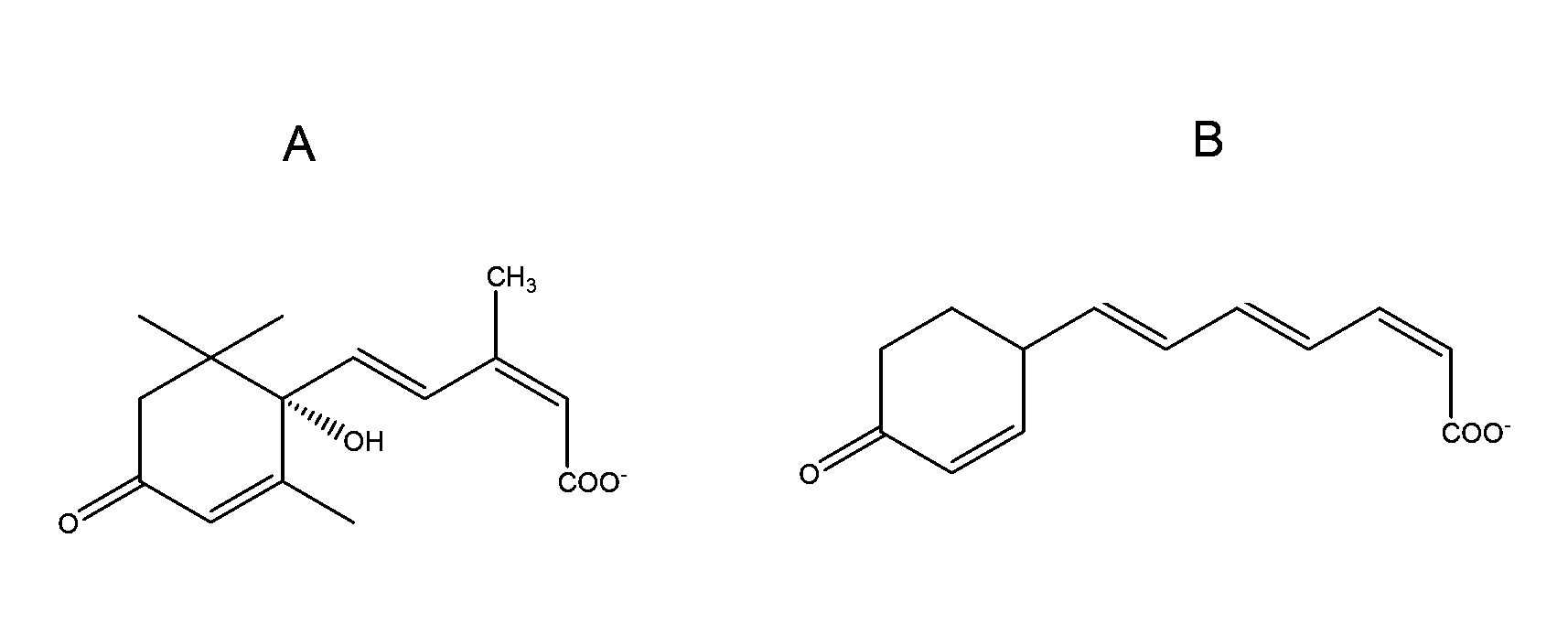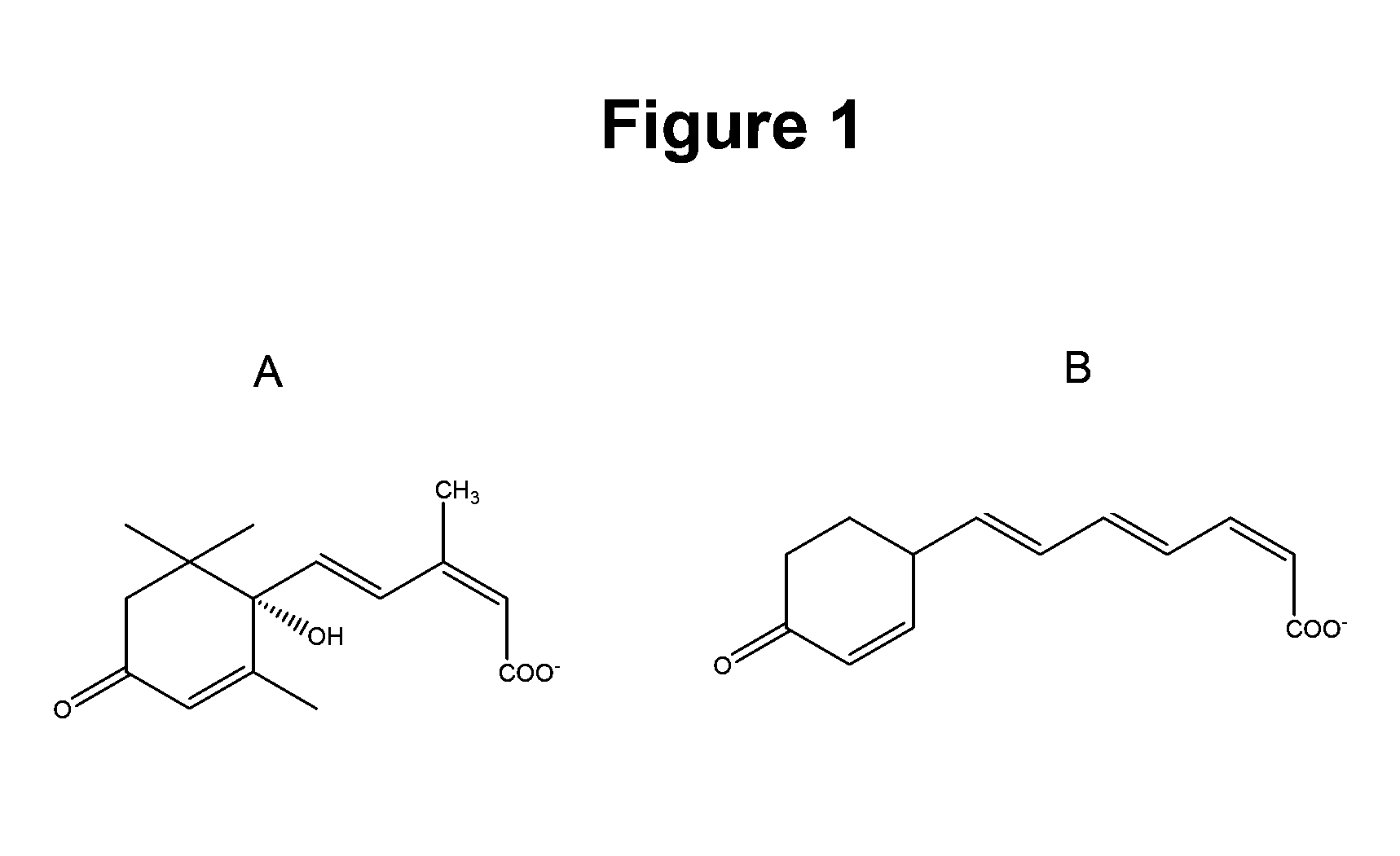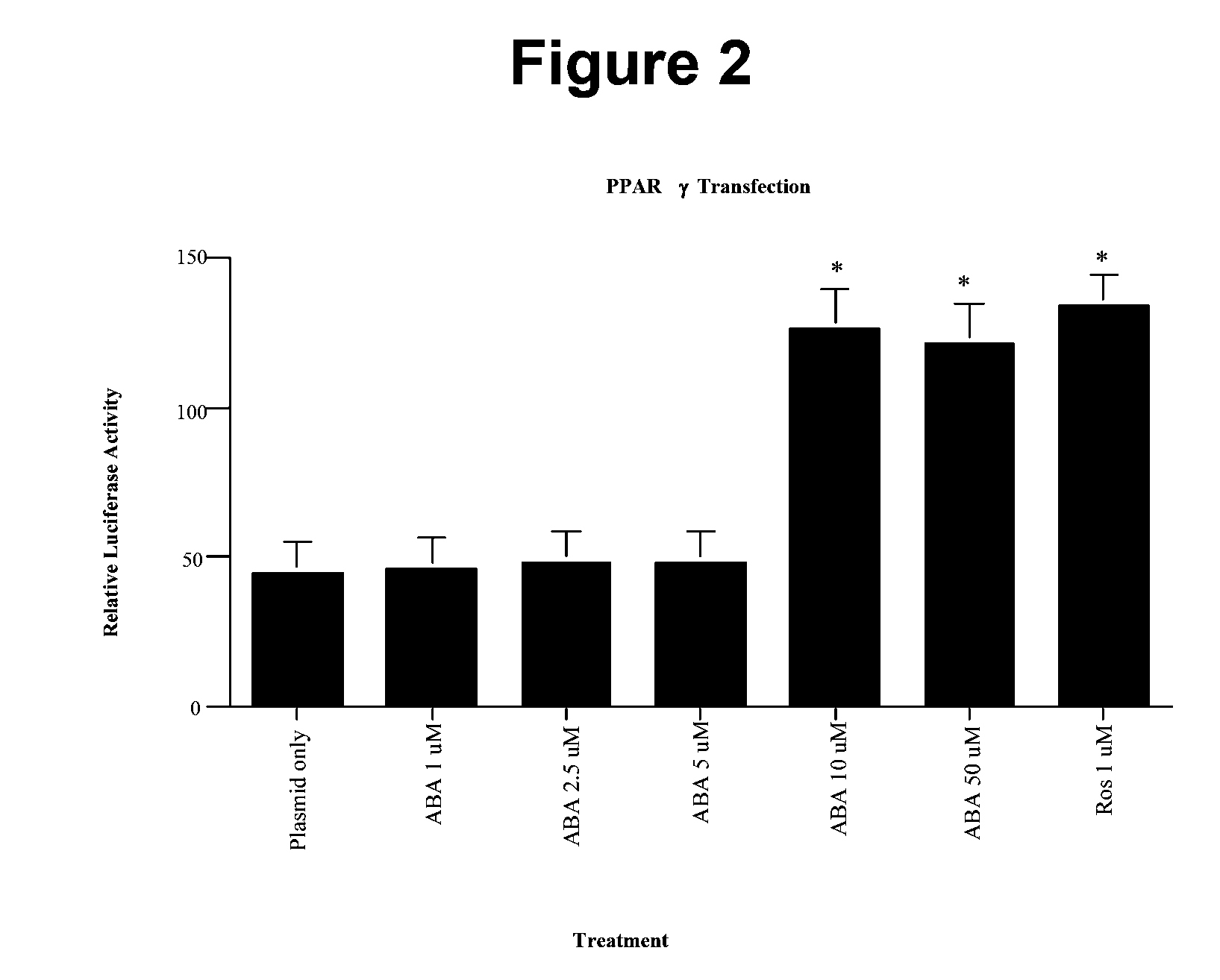Method of using abscisic acid to treat and prevent diseases and disorders
a technology of abscisic acid and abscisic acid, which is applied in the field of medical treatments for diseases and disorders, can solve the problems of no preventative medication currently available for millions of people with prediabetes, the obesity rate in the u.s. and worldwide has continued to climb, and it has reached epidemic proportions. , to achieve the effect of altering the expression or activity of ppar , increasing the expression of ctla-4, and improving the survival ra
- Summary
- Abstract
- Description
- Claims
- Application Information
AI Technical Summary
Benefits of technology
Problems solved by technology
Method used
Image
Examples
example 1
Research Design and Methods
[0123]A. Transfection of 3T3-L1 Preadipocytes
[0124]Transformation plasmid DNA was performed using One Shot TOP10 (Invitrogen, Carlsbad, Calif.). Briefly, 3 μA of the ligation reaction were added to a thawed 50 μl vial of One Shot® cells for each reaction. The vials were then set on ice for 30 minutes, followed by 30 seconds incubation in a 42° C. water bath. Afterwards, 250 μl of pre-warmed S.O.C medium was added to each vial. Vials were then secured on their sides in a microcentrifuge rack and were placed in a Gyromax 727 orbital shaking incubator (Amerex Instruments, Lafayette, Calif.) and incubated at 37° C. at 225 rpm. After 1 hour incubation, 100 μl of each transformation vial was spread on separate, labeled LB agar plates (Sigma-Aldrich, Milwaukee, Wis.), inverted, and incubated at 37° C. overnight. Colonies were selected and isolated using Plasmid Maxi Kit (Qiagen, Valencia, Calif.) according to manufacturer's instructions. After isolation, the plas...
example 2
ABA Activates PPAR γ in 3T3-L1 Pre-Adipocytes In Vitro
[0136]In order to establish whether ABA was a novel ligand of PPAR γ in vitro, we cultured increasing concentrations (1, 2.5, 5, 10, and 50 μM) of racemic ABA with 3T3-L1 pre-adipocytes that were transfected with a PPAR γ-Luciferase plasmid. In concurrence with our hypothesis, ABA significantly increased the relative luciferase activity of the transfected cells beginning at the 10 μM ABA concentration (FIG. 2). No additional increase in PPAR γ activity was observed with the 50 μM ABA concentration. Moreover, the PPAR γ activation obtained from 10 μM ABA was similar to that observed with 1 μM rosiglitazone, indicating that ABA is 10-fold less potent than the synthetic PPAR γ ligand in vitro.
example 3
Dietary ABA Lowers Fasting Blood Glucose and Improves Glucose Tolerance
[0137]To confirm our in vitro findings suggesting that ABA is a novel PPAR γ ligand, we performed two separate in vivo experiments using prediabetic db / db mice. Experiment 1 was a dose-titration study, where we fed 4-week old db / db mice (n=25) diabetogenic, high fat diets containing either 0, 100, 200, 400, or 800 mg racemic ABA mixture / kg diet. Experiment 2 was designed as a replicate of experiment 1 in which db / db mice (n=14) were fed the most effective dose of ABA or a control diet. On day 36, mice fed the ABA-supplemented diets had significantly lower fasting blood glucose (FBG) concentrations, regardless of the amount of dietary ABA (i.e., 100 to 800 mg), than mice fed an isocaloric and isonitrogenous control diet without ABA (Table 2). These in vivo results are in agreement with the transfection findings showing no difference in PPAR γ transactivation between 10 and 50 μM ABA.
TABLE 2Composition of Experimen...
PUM
| Property | Measurement | Unit |
|---|---|---|
| body weight | aaaaa | aaaaa |
| pH | aaaaa | aaaaa |
| thicknesses | aaaaa | aaaaa |
Abstract
Description
Claims
Application Information
 Login to View More
Login to View More - R&D
- Intellectual Property
- Life Sciences
- Materials
- Tech Scout
- Unparalleled Data Quality
- Higher Quality Content
- 60% Fewer Hallucinations
Browse by: Latest US Patents, China's latest patents, Technical Efficacy Thesaurus, Application Domain, Technology Topic, Popular Technical Reports.
© 2025 PatSnap. All rights reserved.Legal|Privacy policy|Modern Slavery Act Transparency Statement|Sitemap|About US| Contact US: help@patsnap.com



